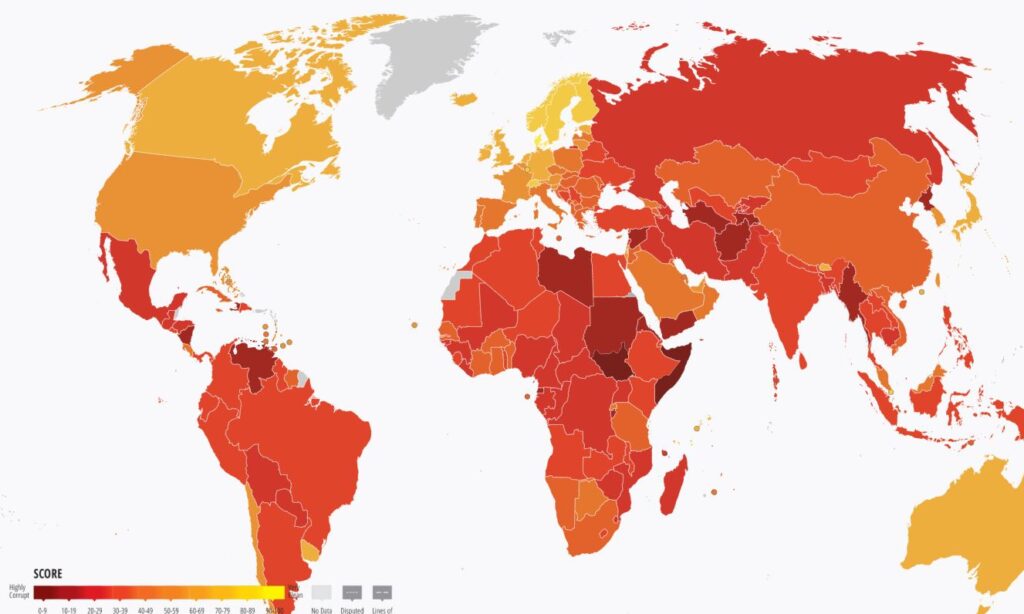Corruption Perception Index 2024 has been recently released by Transparency International, which shows that according to the latest CPI, the UAE happens to be the country immune to public sector corruption in the MENA region. This analysis reveals the impact of corruption on the 180 countries studied and underscores UAE on the strength of political will and commitment to anti-corruption and governance strategies, thereby making it a leader in the region as well as globally.
UAE’s Global and Regional Ranking
In the latest CPI released, the UAE ranked 23rd as per the global ranking with a total score of 68 out of 100. The country is ahead in many of the cited countries in the region, with Israel coming a distant second in the MENA region with a score of 64. But there are a few other countries in the region that have not fared very well, such as Syria, Yemen, and Libya; Syria stood at the lowest with a score of 12, followed by Yemen and Libya with 13 each.
This ranking does show that the UAE continues to be committed to fighting corruption and further ensuring good governance, especially regarding management in the public sector. The report also revealed that the digitization of public services in the United Arab Emirates was a strong contributor to minimizing opportunities for corrupt practices.

Digital Government Strategy for the UAE
The performance of the UAE was singled out for its enhancement of digitalization of government services. Transparency International recognizes the UAE Digital Government Strategy 2025, which aims to further integrate digital solutions within government across sectors. As Manuel Pirino and Kinda Hattar, regional advisers for the Middle East and North Africa at Transparency International, suggested, the strategy is supposed to “support cross-sectoral embedding of digital aspects into overall government strategies.”
The strategy’s emphasis on inclusivity and user satisfaction is taken as a key measure of success. The initiative thus aims to ensure that all benefits from technology are spread to reduce the digital divide and lessen the inequality amongst citizens. This is part of the greater mission to enhance transparency and performance in services and create a more accessible and accountable government to the people.
Regional Challenges and the Need for Change
However, such great performance actions by UAE do not void the shadow cast over the whole region by the latter report. Such stagnating anti-corruption efforts by this region stem primarily from the concentration of political power within just a few hands, usually inclined to mak use of state resources to benefit themselves. So dissent is hard, and there’s no end to corruption and conflicts in countries such as Syria, Yemen, and Libya.
However, quite interestingly, there are notes of hope. According to Transparency International, it is becoming more common for like-minded actors to form coalitions to fight corruption. For example, the change of the Assad regime in Syria has led to more intensive demands for an improved democratic, transparent system. Countries from the Gulf Cooperation Council (GCC) are also increasingly adopting technological solutions like e-governance for public administration improvement and possible reduction of corruption.

A Global Comparison
Finland followed Denmark in ranking as the top nation by the CPI 2024, scoring 90 points in the annual perceptions index by Transparency International. The most reputable nations such as Singapore, New Zealand, and Luxembourg are always ranked within the upper bound due to the existence of strong democratic institutions and effective governing that engage in eliminating the incidence of corruption. Countries like Syria, Yemen, and Libya know the worst scores due to close authoritarian regimes installed and ongoing wars within their boundaries. These issues clearly show that between democratic and corrupted countries, there lies a relationship.
Conclusion
Strong performance at the Corruption Perception Index 2024 by UAE indicates an obvious commitment toward transparency and reform in governance. Along the same line, digitization of public services that is part of the UAE Digital Government Strategy 2025 would greatly enhance in reducing corruption within the public sector. Nevertheless, challenges remain in a broader context for the MENA region, but the UAE stands out as a reference for how technological interventions along with sound governance can mitigate such challenges and improve accountability in public sectors as innovation from corruption.

